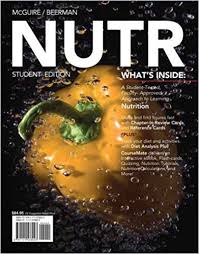In Stock
Test Bank For NUTR 1st Edition by McGuire
Digital item No Waiting Time Instant DownloadISBN-10: 1111578923 ISBN-13: 978-1111578923
Original price was: $55.00.$35.00Current price is: $35.00.
Test Bank For NUTR 1st Edition by McGuire
Chapter 2 – Choosing Foods Wisely
True/False
1. Malnutrition describes conditions of both undernutrition and overnutrition.
2. Malnutrition is a state of poor nutritional status caused by inadequate intake of nutrients.
3. Measures of height, weight, head circumference, and body composition are examples of biochemical assessment tools.
4. Nutritional status is assessed using anthropometric, biochemical, clinical, and dietary methods.
5. Diet recall is a dietary assessment method that utilizes a 3-day food record.
6. The EAR and RDA standards are identical.
7. The MyPlate food guide is a visual tool that illustrates the recommendations found in the 2010 Dietary Guidelines for Americans.
8. The ingredients on a food label must be listed in order of abundance in the food (most abundant to least abundant).
9. It is difficult to compare similar food items using the Nutrition Facts panel because serving sizes have not been standardized.
10. Nutrient content claims and health claims on food labels are both regulated by the FDA.
Multiple Choice: Fact Recall Based
1. Malnutrition describes
A. a state of undernutrition.
B. a state of overnutrition.
C. poor nutritional status caused by an imbalance between nutrient needs and nutrient availability.
D. All of the above
2. Nutrient deficiency and nutrient toxicity are examples of
A. malnutrition.
B. overnutrition.
C. undernutrition.
D. normal day-to-day changes in nutritional status.
3. Factors that influence a person’s nutritional needs include all of the following except:
A. age.
B. sex.
C. activity level.
D. income.
E. genetics.
4. Height, body weight, and body composition are examples of
A. anthropometric assessment tools.
B. biochemical assessment tools.
C. clinical assessment tools.
D. dietary assessment tools.
5. Analysis of blood or urine to determine how much of a certain nutrient or other substance is present is an example of
A. an anthropometric measurement.
B. a biochemical measurement.
C. a clinical assessment.
D. a dietary assessment.
6. During clinical assessment, _____ of a nutrient deficiency are noted by the clinician, while _____ of a nutrient deficiency are reported by the patient.
A. symptoms, signs
B. signs, symptoms
C. laboratory measurements, complaints
D. complaints, laboratory measurements
7. Dietary assessment of nutritional status may include all of the following tools except:
A. diet recall.
B. a food frequency questionnaire.
C. a diet record.
D. menu selection.
8. Dietary Reference Intakes (DRIs) are
A. a set of nutrient intake levels that should not be exceeded by any person at any age.
B. a record of the food items consumed by a reference person over a 3-day period.
C. a set of four dietary assessment standards used to assess and plan dietary intake.
D. a single set of nutrient intake levels based on a record of the food items consumed by a reference person over a 3-day period.
9. The DRIs include all of the following except:
A. Estimated Average Requirements.
B. Recommended Dietary Allowances.
C. Daily Values.
D. Adequate Intakes.
E. Tolerable Upper Intake Levels.
10. The DRI values are established for
A. infants and children and physical activity levels.
B. males and females, infants and children, and physical activity levels.
C. different age groups and physiologic conditions (pregnancy, lactation).
D. males and females, different age groups, and physiologic conditions (pregnancy, lactation).

Reviews
There are no reviews yet.